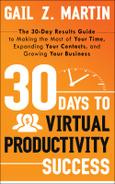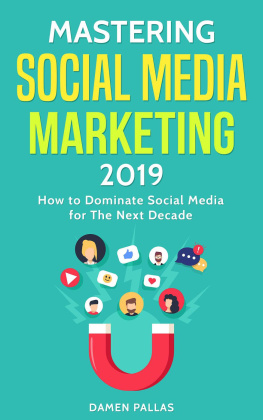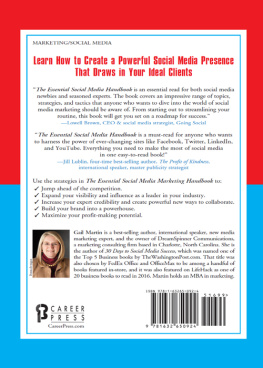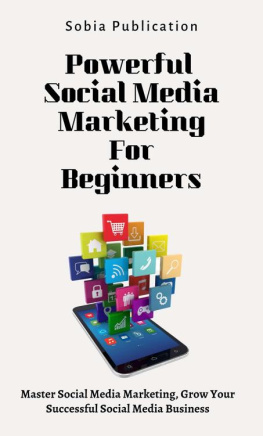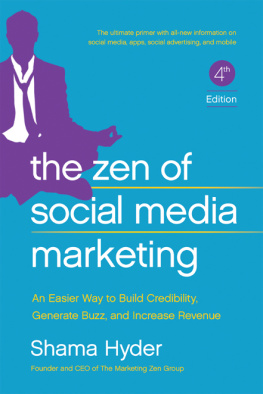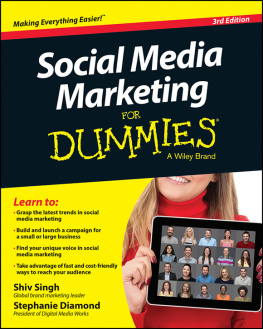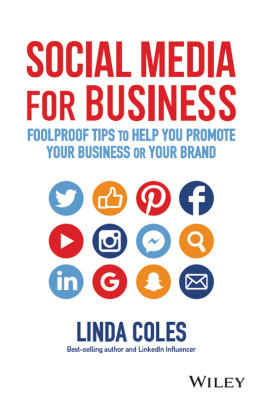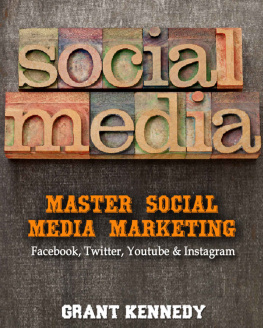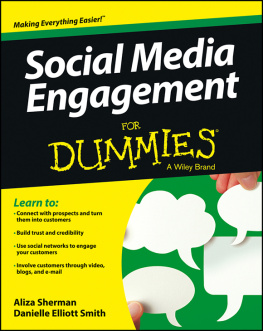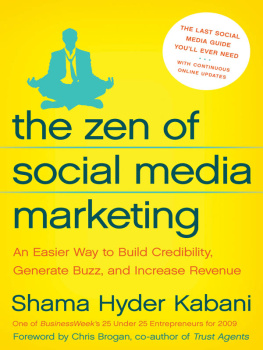THE ESSENTIAL
SOCIAL MEDIA
MARKETING
HANDBOOK
THE ESSENTIAL
SOCIAL MEDIA
MARKETING
HANDBOOK
A NEW ROADMAP FOR MAXIMIZING
YOUR BRAND, INFLUENCE, AND CREDIBILITY
GAIL Z. MARTIN

Copyright 2017 by Gail Z. Martin
All rights reserved under the Pan-American and International Copyright Conventions. This book may not be reproduced, in whole or in part, in any form or by any means electronic or mechanical, including photocopying, recording, or by any information storage and retrieval system now known or hereafter invented, without written permission from the publisher, The Career Press.
THE ESSENTIAL SOCIAL MEDIA MARKETING HANDBOOK
Edited by Roger Sheety
Typeset by Kara Kumpel
Cover design by Jeff Piasky
Icon images by Rachael Arnott/shutterstock
Printed in the U.S.A.
To order this title, please call toll-free 1-800-CAREER-1 (NJ and Canada: 201-848-0310) to order using VISA or MasterCard, or for further information on books from Career Press.

The Career Press, Inc.
12 Parish Drive
Wayne, NJ 07470
www.careerpress.com
Library of Congress Cataloging-in-Publication Data
CIP Data Available Upon Request.
For Larry, Kyrie, Chandler, and Cody.
Writers families have infinite patience.
ACKNOWLEDGMENTS
Thank you to the crew at Career Press including Michael Pye, Laurie Pye, Lauren Manoy, Adam Schwartz, and all the others who brought this book to life. Thanks also to my agent, John Willig, and to the wonderful, knowledgeable experts who agreed to be interviewed and quoted in this book. Im always grateful to my family for all of their encouragement and support. Finally, thank you, readers, for joining me on this adventure through the ever-changing landscape of social media.
CONTENTS
Chapter One: Virtual and Reality:
How Social Media Changed the World
Chapter Four: The Mighty Three:
Facebook, Twitter, and LinkedIn
Chapter Seventeen: Time in a Bottle:
Capturing History on Social Media
SECTION ONE
SETTING THE COURSE
CHAPTER ONE
VIRTUAL AND REALITY:
HOW SOCIAL MEDIA
CHANGED THE WORLD
Without social media, todays world would be a very different place.
Smartphones, 4G bandwidth, widespread public Wi-Fi, and adoption of social media across all age groups have made a whole new, instantaneous level of communication and connection possible with game-changing results. Social media showed us a new realm of possibilities, and in exchange, weve changed in what we want, need, and expect from social media.
Why should you care? Social medias impact on the world changed the business environment forever, presenting unparalleled opportunities and permanently shifting customer expectations. Its no longer a question of whether you need to use social media in business; if you expect to remain profitable, what you really need to know is how to keep up with the changes in social media strategy and use these dynamic, constantly evolving platforms to maximize your brand, influence, and credibility.
Lets start out by taking a look at some of the key ways social media altered the world in which we do business, because youll need to understand the shifts so you can take full advantage of the strategies youll learn as we move forward.
IMMEDIACY
Forget postcards, letters, and e-mail. Forget the six oclock news, the morning newspaper, or this months magazine. Social media enables us to live in the now. We are in the moment more than ever, in ways never before possible. We see what a friend across the country or across the world is having for dinner a moment after the plate arrives on the table. We watch streaming video from a cell phone user in another country and we see what that person sees in real time.
Not too terribly long ago, phone calls were the only immediate form of communication. Live video feeds required expensive, complex equipment and the resources of a major TV news channel, along with crews of trained personnel.
Now, whether its the Arab Spring, the tsunami in Sri Lanka, or an altercation at a traffic stop anywhere in the country, someone will post video, maybe even a live stream. We see history and tragedy as they unfold in real time without the buffer of news anchors or TV networks editing or censoring. We go online to find breaking news instead of turning on the TV. Even in our personal lives, we check out someones Facebook page to see how they are doing, where theyre going on their vacation, or what they did today.
We have grown accustomed to living our lives played out for the world to see on a scale beyond what even the celebrities of yesteryear could have imagined. Not only are we used to the immediacy of sharing our lives moment-by-moment and getting instantaneous feedback, but its easy to become addicted to the rush of validation that comments, shares, likes, and retweets provide. We are all stars of our very own reality show.
Use the immediacy of the Internet and social media to your advantage by inviting your audience at live events to post video, live-tweet, or upload photos to Facebook. Recognize that via social media, you can engage with people who could not attend your event in person, but who can participate virtually by responding to the in-the-moment content you and other attendees post as the event unfolds. Take advantage of the immediacy inherent in video by making use of the ever-expanding range of apps that make Web video easy. Youre limited only by your imagination.
DISINTERMEDIATION AND DECENTRALIZED
INFORMATION FLOW
All hail the rise of the citizen journalist. Gone are the days when the network news teams of the broadcast TV channels curated the information, images, and opinions that reached the public. Social media, the Internet, and cell phones have made everyone a reporter, commentator, and broadcaster.
On one hand, this new decentralized information flow and its lack of institutional filters, censors, and controls frees us to digest information raw. We can find a nearly endless amount of information on every topic, posted by all kinds of sources. To the extent that this makes it much more difficult to suppress information or carry out disinformation campaigns, disintermediation is a good effect of social media.
No wealthy individual, no powerful government, no feared criminal is powerful enough to gag the Internet. WikiLeaks, Edward Snowden, and many other whistleblowers and informants have proven time and again that secrets will come out. And when a media hoax is perpetrated or an urban legend goes viral, it falls as quickly as it rose to prominence, exposed by bloggers, fact-checkers, and sites like Snopes.com.
On the other hand, not all news sources are created equal. Although some may strive to be unbiased or to at least honestly admit their bias, many others take a caveat emptor approach. Astroturf organizationsgroups with earnestly populist sounding names that are actually funded by political or business organizations with a definite agendacan be difficult for the average reader to quickly identify. We can now report and retrieve our own news, but we must also authenticate the information provided to us by others.
Next page


